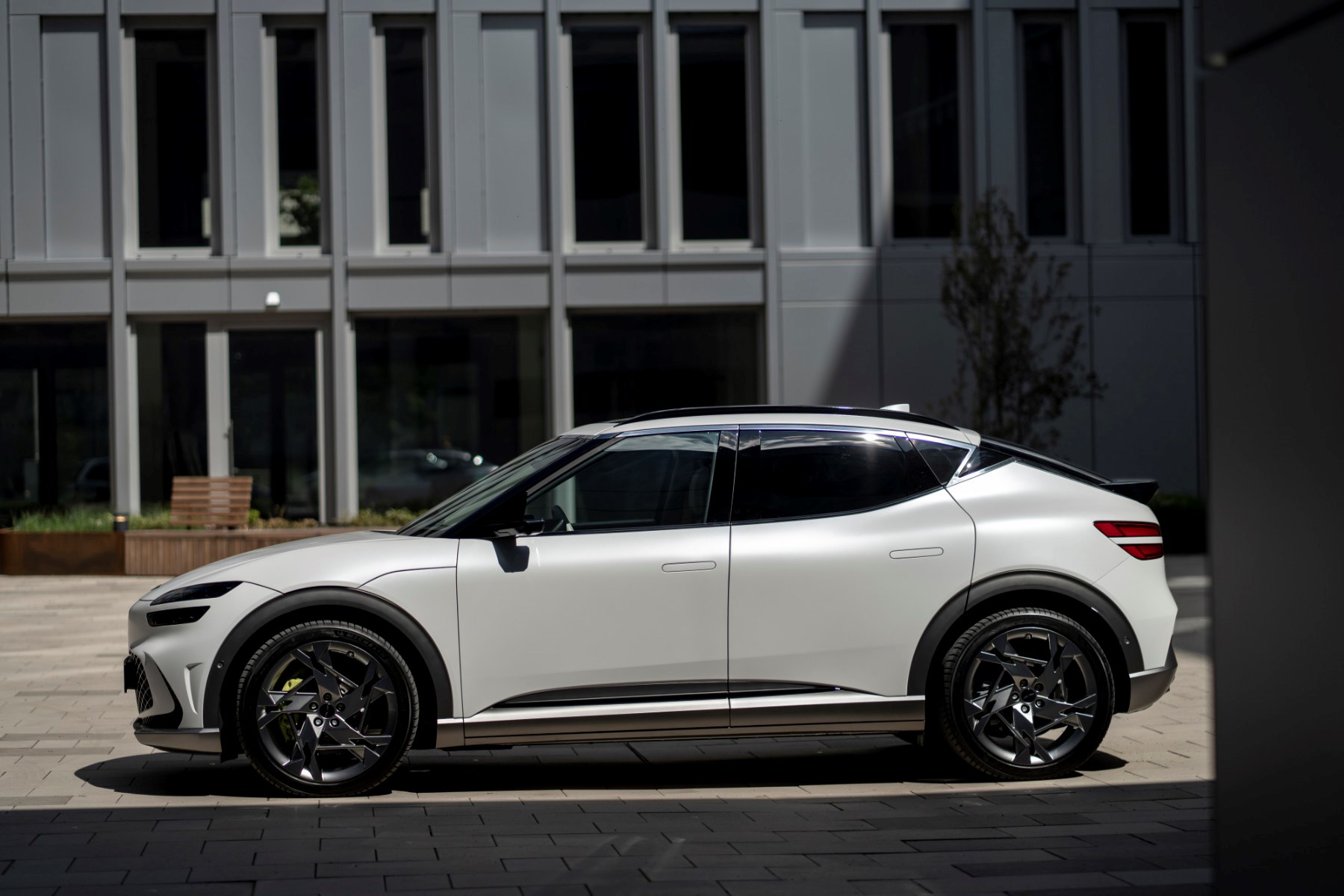► The first electric Genesis tested
► RWD and AWD tested
► GV60 gets 321-mile range, 483bhp
Genesis is firmly aiming its first electric car at ‘high income people between 30 and 40’. These are the kind of millennials who regard saving time as the ultimate luxury and the Korean brand is hoping to make a dent in Europe by nailing its customer experience.
It offers a personal assistant who organises all of the boring maintenance stuff and the car will be collected and dropped off for you. Then there’s the whole ‘we don’t do dealers, we have studios in high-end shopping malls’ instead thing. And there’s no haggling either. Plus you can sign up to a subscription based service that’ll cover you for everything in one monthly payment.
Genesis is attempting to remove the sound of Topman winklepickers scraping on linoleum that you’d normally find in a car salesroom, and replace it with the squelch of a Soho Home corner sofa.
It’s twinned (or rather tripletted) with the Hyundai Ioniq 5 and the Kia EV6, using the same E-GMP platform. That means a great deal of interior space, rapid-charging capability, and dramatic proportions. Not to mention the potential to be one of the best electric SUVs on sale.
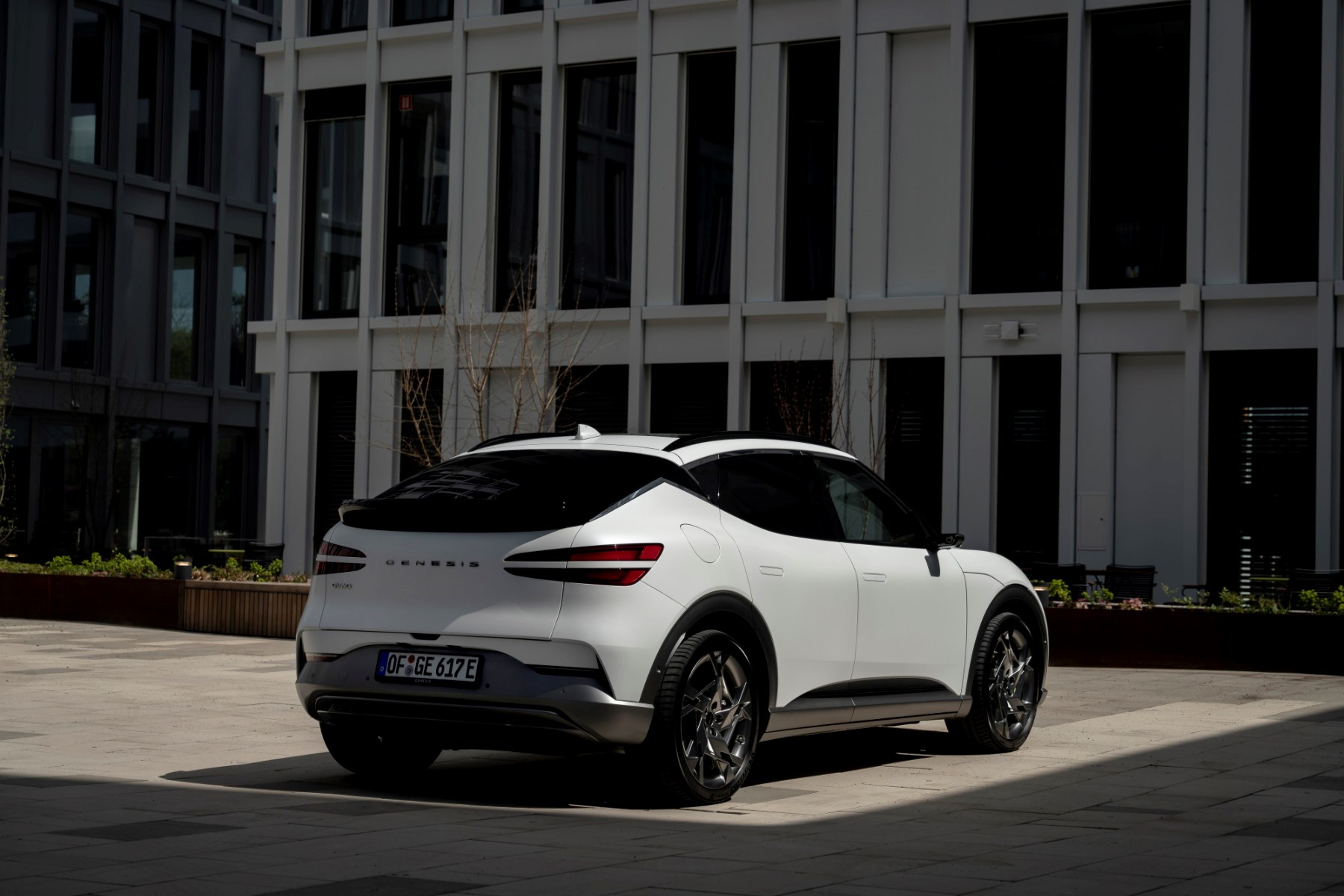
The Genesis wears its rounded lines differently from the angular, retro Hyundai and wedgy, hot-hatchesque Kia, which are much bigger in real life than they appear in pictures. The GV60 looks its size, and feels more like a traditional crossover in proportion. It’s still an arresting design, with a sweeping roofline (yet plenty of rear headroom), and intricate alloy wheels (21-inchers on this car) popping from the arches.
E-GMP showdown: Ioniq 5 vs Kia EV6
It’s the first electric Genesis but not the last. The company plans for all new Genesis models to be fully electric by 2025, and for its non-electric cars to be phased out by 2030.
How about regular luxury?
As well as luxury in the modern sense, Genesis is attempting to step the game up with some out there stuff in this car. The sphere gear selector, which rotates around to reveal a dial to select P, R or D will surely get passengers talking.
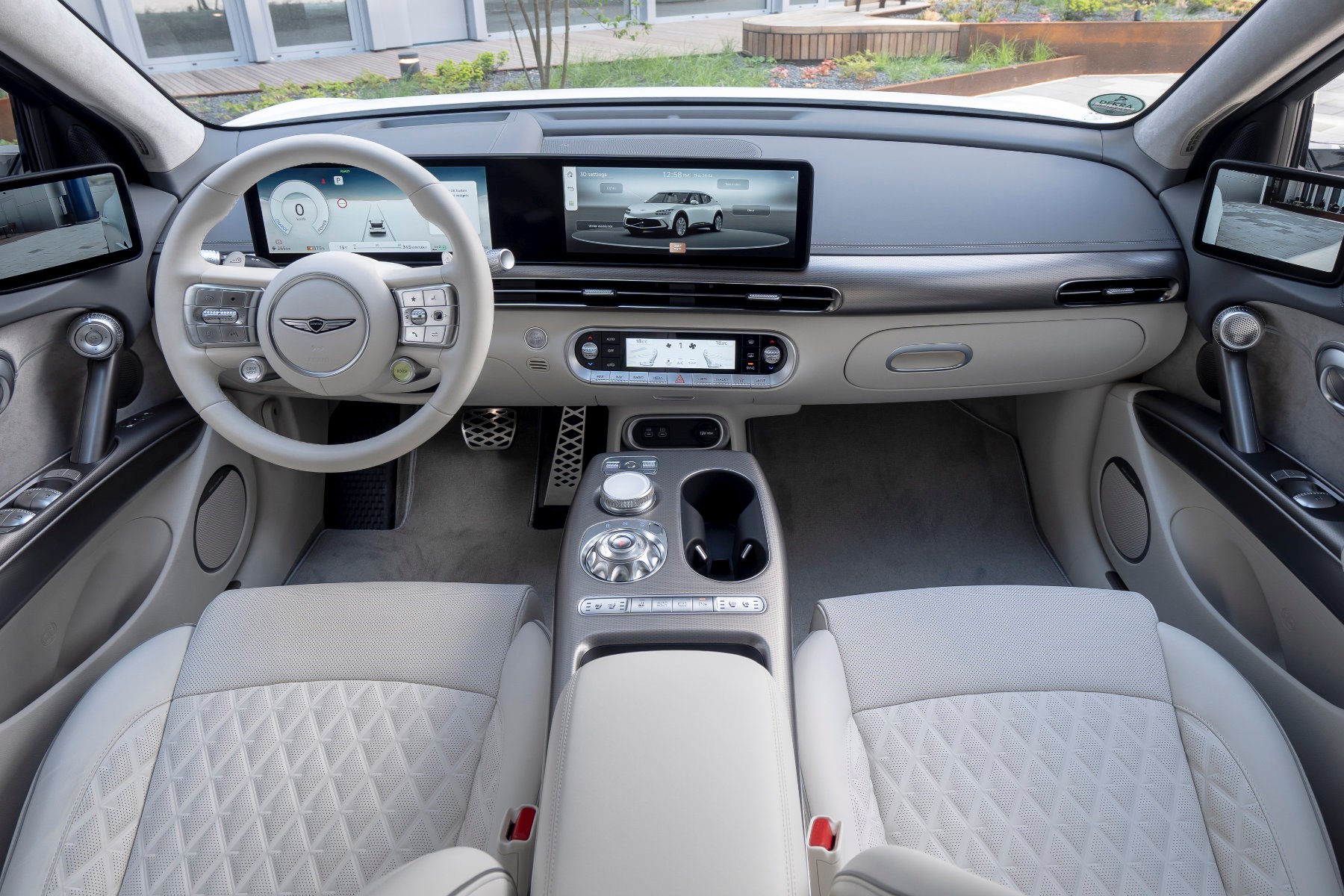
The seats are made partially with corn in order to reduce animal usage, the rear ones recline and the interior can be optioned in space-age white rather than dark and serious black.
And the tech?
There’s a lot of it. Like with the Ioniq 5 and EV6, there’s a vehicle to load system, meaning you can power things from it. You can set up fingerprint technology to let the car know who’s driving so seating and mirror adjustments can be done automatically.
The Bang and Olufsen sound system has noise cancelling tech too, which really works. It’s spookily quiet at times. So quiet it takes a little while to adjust to.

The camera wing mirrors are less brilliant. You constantly adjust your head to no avail. The camera can be adjusted up and down and left and right but it’s still not as good as regular mirrors. Confusingly, these cameras look a lot slower than parking one too, which is a bit trippy when you’re reversing.
Sat-nav isn’t all that either. Instructions on screen are a bit confusing and the HUD instructions are just a half second behind where you are, which is just enough to be annoying.
How does it drive?
There are three power outputs to choose from. The 226 bhp car has a single motor and RWD. While the AWD models have a motor on each axle and four-wheel drive. The Sport model has 314bhp and the Sport Plus features 429bhp.
The shove from the twin motor Sport Plus model is initially relentless before becoming just rapid. It loses steam at a far slower rate than some EVs, and even at 210kph on the autobahn it was still punching a hole in the air like an F1 car with its DRS open.
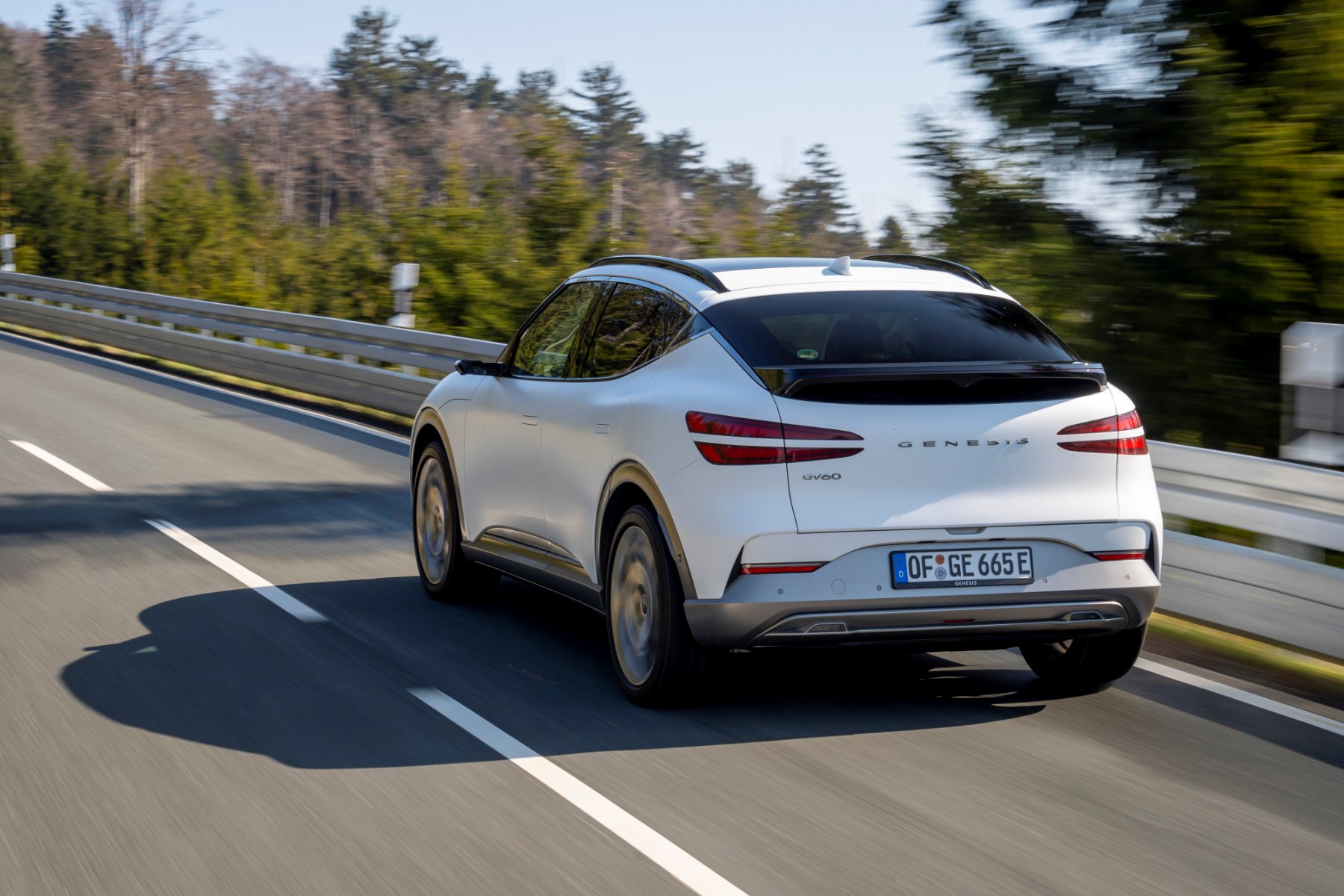
There’s a boost button too. This ups the power to 483bhp for 10 seconds, which Genesis assures us is useful for overtaking safely….
With boost mode engaged the acceleration is ravenous and from a standing start the tyres chirrup as the road beneath you is pummeled into relinquishing grip.
But you see where this is going, don’t you? Like with other EVs, the straight line speed is ungodly but there’s no escaping its two-tonne weight in the bends. The steering is oddly heavy, even when in comfort mode, but it grips and flings you out of a corner. There’s also a drift mode with a very complex starting procedure that we’re yet to sample.
The single motor model isn’t what you’d call slow, but you can feel the difference between the pair. Sadly it never really feels rear-wheel drive.
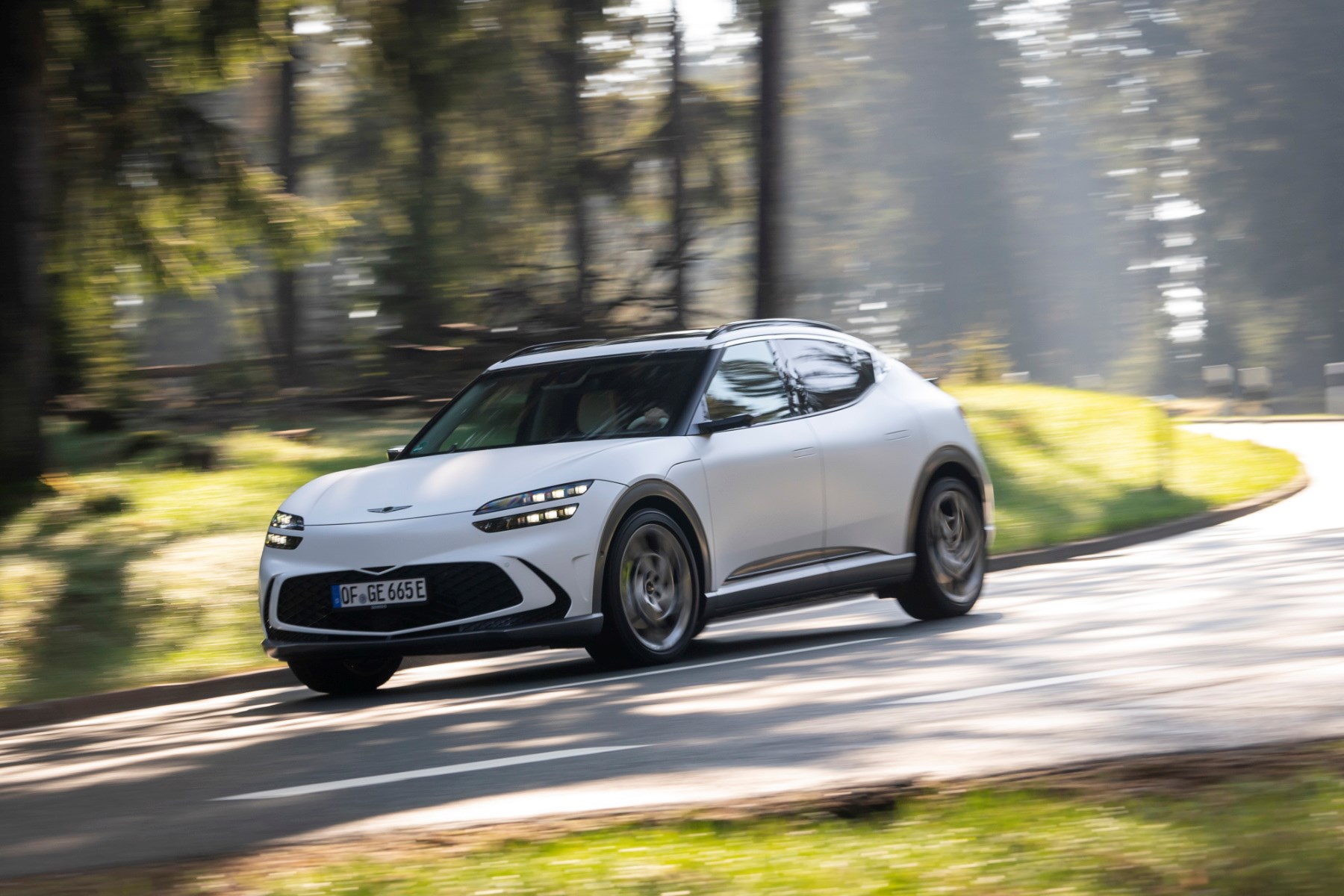
At motorway speeds the ride is sublime. Genesis’ active suspension with cameras does a great job of adjusting the dampers to the road ahead. At lower speeds it’s not quite as serene, often ricocheting in between dimples and potholes. The heavier AWD car begins to feel agitated at town speeds, whereas the less lardy RWD model seems to skip over imperfections rather than crash into them.
Range and charging
WLTP range for the single motor is 321 miles while the Sport model will officially do 292 miles and Sport Plus registers a 290-mile score. We’re yet to do any official range tests yet, but we’ve found the Kia EV6’s and Hyundai Ioniq 5’s range predictors to be very accurate.
When you do need to charge, the GV60, thanks to its 800V charging capabilities, can go from 10-80% battery in 18 minutes. Assuming you can find a charger that fast.
Practicality
A flat-roofed pub is shorthand for rough as a badger’s bumhole but a flat-floored EV stands for space. A six footer can sit behind a six footer with ease and the rear seats can even recline for an added bit of space.
The boot (432 litres) isn’t all that, but the lip is flat and there’s enough underfloor storage for charging cables. There’s a small frunk too, measuring in at 50 litres for the single motor model and 20 for the twin motors.
Genesis GV60: verdict
If Genesis’s large and resolutely combustion-powered initial launch models in the UK felt very much like niche products, the GV60 has the potential to appeal to a truly wide audience (albeit a relatively deep-pocketed one, given its price premium over other E-GMP cars). The clean-slate EV paradigm shift for consumers means that the old, established brands are no longer an obvious choice. For Genesis to gain a foothold in the UK, the GV60 feels a perfect car, and an extremely credible one.
A superb effort, in other words. The GV60 offers something different without just doing it for the sake of it. It’s a separate prospect to the Germans and it’s all the better for it. Adventurous well-off 30 to 40 year olds, you’ve found your premium electric SUV.
